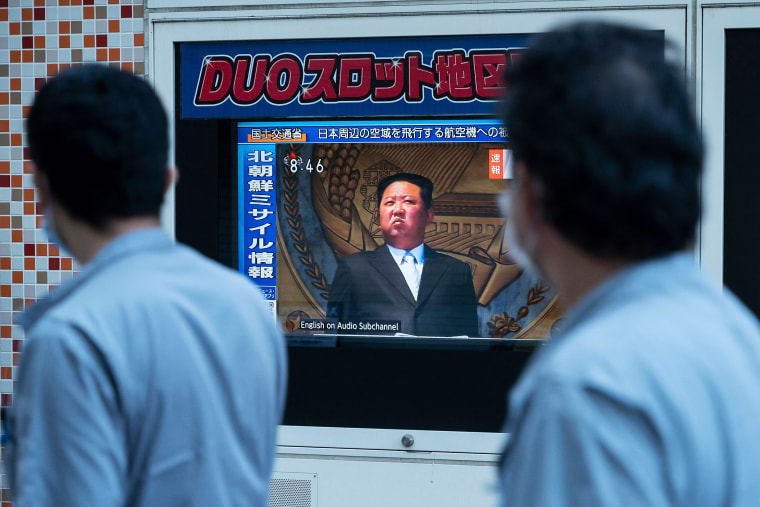With the world anxiously watching mounting nuclear threats from Moscow, another pariah on the world stage has just reminded everyone that it too has the means to cause mass destruction.
North Korea launched a ballistic missile over Japan and into the sea Tuesday. It flew further than any previous test by the North, prompting cellphone alerts for Japanese residents to evacuate to shelters and halting commuter-packed trains in the country's north until it was clear the missile had passed.
Secretary of State Antony Blinken condemned what he said was a "reckless and dangerous" move that posed "an unacceptable threat to the Japanese public." In recent days U.S. officials have also been forced to respond to threats from Russian President Vladimir Putin and growing concern that he may follow up with action as his military is forced to retreat in Ukraine while unease grows at home.
So should we be worried about the double nuclear threat from North Korean leader Kim Jong Un and the Kremlin?
A reminder from Pyongyang
It's often just as difficult to gauge the opaque intentions of Kim as those of Putin. But some experts see a link here.
"Global attention has understandably been focused recently on Russia’s war on Ukraine," so North Korea wants "to remind the world that it exists," said Robert Ward, a Tokyo-based senior fellow at the International Institute for Strategic Studies think tank.
John Nilsson-Wright, a senior research fellow at the British think tank Chatham House, agreed.
"It's an effort to say, 'We're still here and we want renewed dialogue,'" he said. "It's an attention-grab."

This was the latest of some two-dozen North Korean tests this year, the most since Kim took over the reclusive regime more than a decade ago.
Officially, North Korea says it's a response to military exercises between the United States and South Korea, with whom it has technically been at war since the 1950s. Pyongyang sees the drills as planning for an invasion.
By appearing to ramp up its weapons tests this year, North Korea also likely wants to rekindle talks with the U.S. and its regional allies, an attempt to force concessions to help its isolated, heavily sanctioned economy.
Diplomacy stalled during the administration of President Donald Trump and has not really gotten going again. Washington says it wants denuclearization; Pyongyang wants sanctions to be eased, “having been battered by Covid and other factors,” Ward said.
Kim's regime has tested most of the separate parts needed to strike the mainland U.S. with a nuclear warhead, and some experts believe it already can. But most don’t believe it plans to do this preemptively, rather using its arsenal as insurance against Western-backed regime change.
As well as a symbolic geopolitical move, Tuesday's test was also likely an attempt to hone that ambition on a technical level. Arms control analysts said the missile was likely a Hwasong-12, an intermediate-range weapon that probably could have reached the U.S. territory of Guam if pointed in that direction.
Though not unprecedented or even surprising for some analysts, the test is still being viewed as an escalation and comes days after Vice President Kamala Harris visited the so-called Demilitarized Zone between North and South Korea.
The U.S., which has warned Russia of “catastrophic” consequences if it does use nuclear weapons, responded to North Korea’s test by launching fighter jets in a joint show of force with South Korea.
The last time North Korea launched a missile over Japan, in 2017, it conducted its sixth and most recent nuclear test the following month.
There has been speculation that it may be preparing a seventh.
A 'different dynamic'
Such a dramatic escalation from Kim would come as Putin already has the world on edge by issuing repeated threats that he could use nuclear weapons against Ukraine or the West as his seven-month invasion falters.
Last week, he proclaimed the illegal annexation of four Ukrainian regions — despite only holding a shaky control over them — and suggested he would not be afraid to use nuclear weapons to defend these areas that are internationally recognized as Ukraine.
North Korea came out in support of that annexation Tuesday, with its foreign ministry issuing a statement calling out Washington's “gangster-like double standards” because it often interferes in other countries' affairs.
But the North Korean test this week should not be viewed on the same level as the unknowable and volatile situation playing out inside the Kremlin walls, said Nilsson-Wright at Chatham House.
For a start, the thing that concerns many experts about Putin is his world-ending power coupled with his current domestic position.
His military has suffered a series of humbling defeats on the battlefield, prompting the chaotic effort to call up hundreds of thousands of military reservists and growing pressure from hard-line figures to escalate further.
Launching a nuclear weapon, even in a limited tactical strike on the battlefield, would be seen as a historic step that could send the situation spiraling. But few can confidently predict the actions of Putin, who has some 6,000 nuclear weapons at his disposal.
By contrast, there has been no such evidence of real domestic pressure on the Kim dynasty in North Korea. The country remains impoverished but ruled with an authoritarian iron fist.
"Seeing the anxiety in Europe caused by Russia's nuclear threats, North Korea may feel emboldened to use that," Nilsson-Wright said. "But other than that, it's a completely different dynamic."
And even with Kyiv's forces breaking through Russian lines to make crucial advances in the south and east, Western officials and experts have played down fears of a Russian nuclear attack.
Blinken said last week that while nuclear threats are "the height of irresponsibility," so far the U.S. has "not seen them take these actions" to suggest Moscow is actually considering using them.
“We have seen nothing at this stage that would compel us to change our posture,” a senior U.S. military official said Monday on condition of anonymity.
